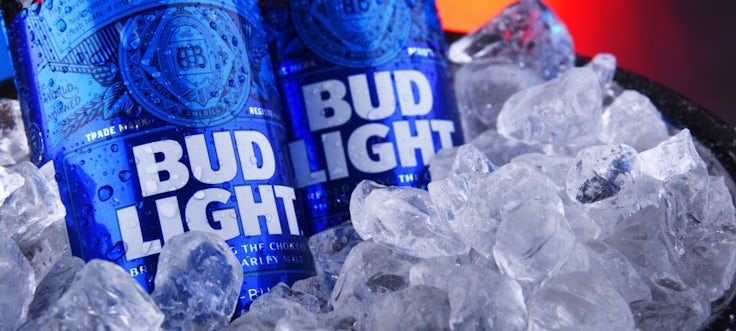Bud Light backlash: AB InBev reports 14% volume decline in US
AB InBev outperformed analysts’ expectations but was weighed down by a 14.1% decline in volume sales in the US, with its CEO saying consumers want “beer without the debate”.

Beer business AB InBev has once again seen its commercial performance impacted by the controversy surrounding its Bud Light brand and trans influencer Dylan Mulvaney, which prompted a boycott in the US.
AB InBev saw volume sales decline by 1.4% in the second quarter, driven by a 14.1% drop in North America. The decline was less pronounced in EMEA at 0.1%, while Asia Pacific grew by 9.5%. AB InBev claims it saw volume sales increase in most markets.
Sales to retailers also dropped in the US, declining by 14% in the quarter, which the company said was “primarily due to the volume decline of Bud Light”. Its earnings before tax in the US also dropped by more than a quarter (28%) in the period, which it attributed to a decline in market share. The US made up more than a sixth of AB InBev’s total sales in 2022 and Bud Light is its biggest brand in the country.
The boycott in the US started in April after it briefly partnered with Mulvaney, a trans woman, to promote its ‘March Madness’ activity. The partnership provoked backlash from some right-wing public figures and calls for a boycott.
Bud Light did not do any more activity with Mulvaney after the initial video but several months on, it is still having a significant impact on the company’s performance.
Indeed, Molson Coors CEO Gavin Hattersley claimed yesterday (2 August) its brands are seeing increased demand from consumers.
“Coors Light and Miller Lite combined were 50% bigger than Bud Light by total industry dollars [in the second quarter],” he claimed. In 2022, Bud Light had been bigger than both brands combined.
Bud Light brand health shows no sign of recovery as impact of backlash persists
Overall, AB InBev, which also owns brands such as Corona and Stella Artois, reported better-than-expected financial results for its second quarter, which ended 30 June 2023.
Its revenues grew 7.2% year over year to $15.12bn (£11.95bn), while its earnings before tax (EBITDA) increased 5% to $4.91bn (£3.88bn). Analysts had forecast revenues would increase by 6.4% and EBITDA would increase by just 0.4% in the quarter.
Not widespread
While AB InBev’s most recent financial results indicate Bud Light’s consumers may be turning to other beers, the company claims any backlash against the brand is not widespread. It cited research it commissioned with a third-party company with more than 170,000 people, which found most in the US feel positively towards the brand, with around 80% of consumers having either positive or neutral feelings towards Bud Light.
While it admits it has seen declining market share in the US for the brand since the backlash, it claims this has been stable from the end of April until the end of June.
CEO Michel Doukeris told investors on a call today (3 August) that its team in the US is “working hard to build [share] back”. He said insight suggests consumers across the US want Bud Light to focus on universally-loved channels like the NFL.
“They want to enjoy their beer without the debate,” he claimed.
AB InBev said it has been supporting the brand by continuing to invest in areas like sports partnerships. Across its brands and markets, it stepped up marketing and sales spend by 12.8% in the first half of the year to around $3.5bn (£2.8bn). This stepped up spend drove increased portfolio brand power in 60% of its markets, the company claimed.







